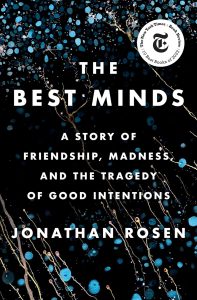The Stigma of a Mental Illness and the Tragedy of Not Recognizing the Reality of It
The Best Minds: A Story of Friendship, Madness, and the Tragedy of Good Intentions is an incredible story, recently recognized by the New York Times as one of the best books for 2023. I listened to the audiobook narrated by author Jonathan Rosen and found it gripping.
Rosen’s story about his tortured relationship with his neighbor and sometimes best friend, Michael Laudor, unfolds like a taut drama spanning more than thirty years in their lives.
Rosen writes and reads his prose like most authors wish they could. Listening to him tell the story places us in the front row of this amazing tale of a tragic figure whose brilliance hid the depths of his mental illness from many well-meaning supporters who were willing to dismiss, collude, and ignore his need for something more than academic accommodations or benevolent denial.
The Best Minds
I will try not to spoil the book, but as the title implies, the tale ends badly. I just realized the Amazon description provides a synopsis, so I’ll issue a SPOILER ALERT:
This is a story of friendship fraught with rivalry and envy as Rosen refers to himself as the “tortoise to Michael’s hare.” Both were high-achieving adolescents from the upper middle class in New Rochelle, NY. Rosen and Laudor vied for the editorship of their high school paper. Both attended a summer program at the prestigious Telluride House at Cornell and were later admitted to Yale, where Michael whizzed through in 3 years.
Then Michael got sick––a first psychotic break followed by months of inpatient treatment and transfer to a halfway house. Tragic, right? But we should also note that the pathos of a high-flying, over-achieving white Jewish kid diagnosed with schizophrenia might obscure the legions of nonwhite, marginalized youth who follow a similar path.
Michael’s unfortunate story might have ended there or progressed from the hospital to aftercare and psychological rehab. Maybe with this conventional path toward recovery, Michael might have been able to return to school and manage his illness more successfully than was the case.
Instead of suffering the indignity of working as a clerk at Macy’s as part of his psychosocial, vocational rehab, which Michael and his parents blanched at––insert drum roll––Michael went to Yale Law School. Accepted before his psychotic break, Michael had deferred his admission and enrolled as a first-year law student at Yale at a time when concerns about mental health justice meshed with a liberal social climate influenced by those who viewed mental illness as a social adjustment problem in need of a tolerating and accommodating environment.
Dazzled by Michael’s verbal brilliance, the administration and faculty were willing to overlook his severely impaired executive functions. Yale Law School became a halfway house filled with supportive instructors and administrators willing to do whatever it took to provide accommodations so that the young man, who knew everything but had great difficulty managing his responsibilities, could remain afloat.
Michael graduated and wanted to become a faculty member. Still, even more improbable events were taking shape–a high-profile NYT article, leading to a six-figure advance on a book, and a Ron Howard movie about his life with Brad Pitt cast to play him.
Suffice it to say, the train went badly off the track. Michael stopped taking his medicine for the delusions that had never gone away. Michael didn’t write his autobiography, and they didn’t make the movie about his incredible life. Instead, in his delusional state, he stabbed his pregnant fiancée, Carrie Costello, to death.
The Moral Dilemma Of Mental Illness
Rosen’s first-hand account presents us with a moral dilemma when it comes to mental illness and disability. Do we attempt to erase the stigma of severe mental illness? Of course. Who would disagree that stigmatizing those who suffer from chronic mental illness or disabilities should not be dehumanized by reducing them to a set of symptoms or diagnoses?
Some would object to the limitations baked into the words “illness” and “disability,” viewing such conditions as social and political constructs instead of actual mental health problems. However, The Best Minds is a story about what happens when our concerns about protecting people from the labels that stigmatize obstruct our vision about the nature of the affliction, sickness, illness, disability, or condition with which the individual must live and attempt to adapt.
Mental Illness As Myth
There is a long history of anti-psychiatry voices that question the validity, philosophical, and ethical underpinnings of mental health diagnosis and treatment. Figures like Thomas Szaz and RD Laing, both trained psychiatrists, eschewed traditional mental health concepts and argued against the medicalization of what they felt were social constructs and adaptations. While Szaz believed that mental illness was a medical “myth,” Laing regarded schizophrenia as a normal psychological adaptation, not an illness.
I wanted to write about this riveting story because I found it staggering and terribly sad. More than anything, it is a cautionary tale about the tension between the rights and dignity of the individual, the stigma of mental illness, and how many well-minded individuals see only the individual’s potential and overlook the reality of the underlying illness.
As mental health professionals, we strive to understand and treat the person with the illness and not simply the symptoms or illness. Michael’s story goes past this standard and unveils an ethos in a society where accommodating to disabilities may stop short of providing the necessary kinds of support and treatments for the underlying condition. Michael’s story is about the “tragedy of unintended consequences” in such cases.
Another Take On Mental Illness
Rosen’s story about Michael reminded me of a recent Opinion Piece in the Washington Post by Amy S.F. Lutz titled, “I’m tired of disability activists pretending my son doesn’t exist.” Written by a parent of a severely autistic and intellectually disabled child, Lutz took issue with disability advocates who were seeking to get rid of Section 14(c) of the Fair Labor Standards Act, which allows some vocational programs to pay some adults a subminimum wage based on standardized assessments of their productivity. The programs, not unlike the aftercare mental health support systems like Michael Laudor began to take part in, offer job training for severely intellectually disabled adults, which families overwhelmingly support.
Lutz takes issue with disability rights advocates, like those Michael encountered at Yale and beyond, who hold a sanitized version of disability in which there is no such thing as a “severe cognitive disability” (insert severe and chronic mental illness).
The writer closes with words worth memorizing, “We need to have an honest conversation about impairment–not pretend it away.”
Here are several take-away points:
- According to NAMI (National Alliance of the Mentally Ill), approximately 100,000 young people experience psychosis in the US each year, and 3 in 100 people may have an episode at some point in their lives.
- The stigma of mental illness is real and contributes to the denial of symptoms and reluctance to seek help.
- Untreated psychosis may increase one’s risk for victimization, unemployment, homelessness, and, in a fraction of cases, violence.
- Most individuals with psychotic disorders do not engage in violence, and most violent individuals do not have psychosis. Furthermore, only a fraction of all murders are committed by individuals with psychotic disorders
- The number of homicides related to severe mental illness can be prevented by earlier and more effective treatment and follow-up, as well as the implementation of ways to reduce the stigma and discrimination toward mental illness in the public eye.
- Humane treatment balances the ongoing support and treatment needs of the individual with advocacy for the rights of individuals with chronic and persistent mental illnesses.
- NAMI is a resource for individuals and their families, providing information about psychosis and other mental illnesses and support for individuals and their families.
- NAMI also provides information about early identification and treatment for young people with signs and symptoms of psychosis.
- More info here: https://www.samhsa.gov/esmi-treatment-locator
Mental Illness In Fiction
In both of my novels, The 11th Inkblot and my latest release, Tears Are Only Water, the lead characters suffered from psychotic breaks. Though the characters, Anton Zellinsky and Carmine Luedke, were not suffering from schizophrenia, they each had a life-disrupting psychotic episode. They improved only when their conditions were recognized and addressed with medication and therapy.
However, The Best Minds is a story about what happens when our concerns about protecting people from the labels that stigmatize blind us to the reality of the illness, disability, or condition that individuals and their families must learn to adapt to.
***



